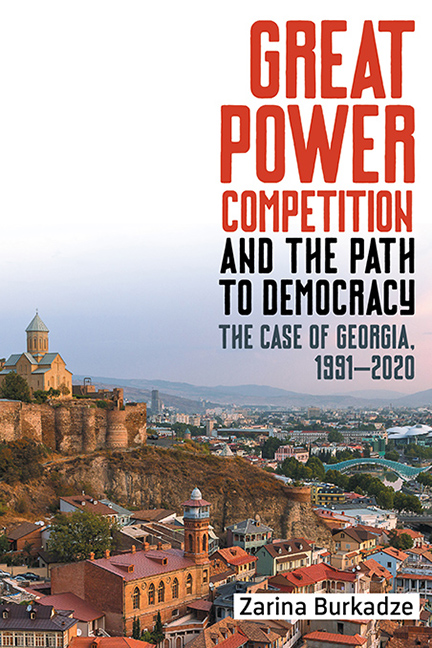Book contents
- Frontmatter
- Contents
- Preface
- List of Acronyms and Abbreviations
- Introduction: The Puzzle of Georgian Democratization
- 1 Autocracy and Democracy in Georgia: What Made the Difference?
- 2 Democratization without Great Power Competition, 1991–1993
- 3 Pluralizing Geopolitical Space, 1993–2003
- 4 The Dictatorship of Democrats, 2003–2012
- 5 Democratic Arrival? 2012–2020
- 6 Democracies In-Between
- Conclusion
- Appendix: List of Interviews
- Bibliography
- Index
6 - Democracies In-Between
Published online by Cambridge University Press: 16 July 2022
- Frontmatter
- Contents
- Preface
- List of Acronyms and Abbreviations
- Introduction: The Puzzle of Georgian Democratization
- 1 Autocracy and Democracy in Georgia: What Made the Difference?
- 2 Democratization without Great Power Competition, 1991–1993
- 3 Pluralizing Geopolitical Space, 1993–2003
- 4 The Dictatorship of Democrats, 2003–2012
- 5 Democratic Arrival? 2012–2020
- 6 Democracies In-Between
- Conclusion
- Appendix: List of Interviews
- Bibliography
- Index
Summary
In this final chapter, I zoom out from Georgia to examine the cases of Armenia, Azerbaijan, Moldova, and Ukraine. The United States, NATO, EU, and Russia empowered local allies with different intensities in these democratizing states. Russia, for example, expanded its efforts to provoke separatist conflicts and impede democratization in order to prevent membership in the Euro-Atlantic institutions. For instance, the Nagorno-Karabakh conflict increased Armenian dependence on Russia and exacerbated its geopolitical position. Russia determined the basis of the Russian-Armenian cooperation by building an illegal military base in Gyumri. Other military bases illegally built by Russia are in the Georgian territories of the South Ossetia and Abkhazia regions. These military bases permit Russia to mobilize its aerospace, air defense, and naval forces and control the South Caucasus, the Black Sea, and the Caspian Sea regions.
As a result of the Nagorno-Karabakh conflict, Armenian politicians who based their political rhetoric, actions, and policies on this conflict have, unsurprisingly, also increased their dependence on Russia. The current Armenian prime minister, Nikol Pashinyan, and the first president of the Nagorno- Karabakh region, Robert Kocharyan, denied Russia's role in this conflict and pursued policies aimed at weakening prodemocracy forces in Armenia. Western democratizers have few instruments of leverage in Azerbaijan because of Azerbaijan's reliance on Turkey to counterbalance Russia. For Turkey, democratic governance is not a precondition for rendered assistance. When President Elchibey withdrew Azerbaijan from the Commonwealth of Independent States (CIS), Russia took countermeasures by openly supporting Armenia, removing Elchibey through a quasi-coup, and providing Aliyev with opportunities for seizing power. The US Congress linked democratic improvement to their support for Eurasian countries, however, and so restrictions applied to Azerbaijan because of the Nagorno-Karabakh conflict until 2001. These circumstances made the journey of both states toward the West uncertain, and their political regimes more authoritarian than they might have been had democracy promoters cultivated greater leverage in either country, as they had done in Georgia.
Russia also exploited ethnic tensions in Moldova in ways that paralleled their strategy in Georgia, resulting in the armed conflict between Moldova and its breakaway region of Transnistria. The conflict was localized, and the breakaway region rested on Russian support, while Moldova fostered connections with the United States and embarked on a European path. Pro-Russian political parties and societal groups were well established in Moldova, which lessened Russian concerns regarding Moldova's NATO membership.
- Type
- Chapter
- Information
- Great Power Competition and the Path to DemocracyThe Case of Georgia, 1991-2020, pp. 133 - 158Publisher: Boydell & BrewerPrint publication year: 2022



